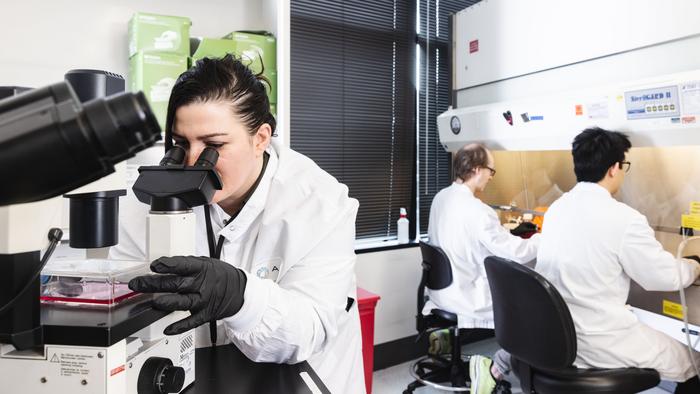The Access to Advanced Health Institute Receives $18 Million Award to Develop a Temperature Stable, Single-Dose Chikungunya RNA Vaccine Through a Phase 1 Clinical Trial

Credit: Delaney Brown Photography
The Access to Advanced Health Institute Receives $18 Million Award to Develop a Temperature Stable, Single-Dose Chikungunya RNA Vaccine Through a Phase 1 Clinical Trial
KEY POINTS:
- The goal of the award is to develop an effective chikungunya vaccine candidate that can reach endemic areas of the world by using AAHI’s innovative RNA platform technology.
- The project will demonstrate that classic large-scale manufacturing challenges of live-attenuated vaccines can be overcome by using standard manufacturing equipment and techniques that are easy to tech transfer and scale.
- The award supports a first-in-human clinical trial of a dried (lyophilized) formulation of AAHI’s RNA platform technology.
SEATTLE, Washington, August, xx, 2023 – The Access to Advanced Health Institute (AAHI) announced today that it has received an $18 million award from the National Institutes of Health (NIH) to develop a temperature stable, single-dose vaccine candidate for the chikungunya virus. The vaccine uses the innovative RNA platform technology to protect against the virus, a major cause of morbidity and mortality in Asia, Africa and Latin America for which no vaccine exists. AAHI’s approach to an RNA vaccine against chikungunya is distinctly different from the RNA vaccines which are currently approved by the FDA to prevent other diseases. Unlike other RNA vaccines, this candidate will generate a live “attenuated” virus that could potentially induce strong and long-lasting immune protection against this mosquito-borne disease. The award from NIH will support development, preclinical testing and human clinical evaluation of a vaccine that meets an increasingly urgent need for a reliable, abundant supply.
While not commonly fatal, chikungunya virus causes fever, headache, rash, and debilitating often chronic joint and muscle pain. People with chronic chikungunya symptoms often overwhelm healthcare services in areas of the world where there is already poor healthcare infrastructure, which perpetuates health inequity. The goal of the award is to develop an effective chikungunya vaccine candidate that can reach endemic areas of the world. AAHI’s RNA vaccine technology does not require the complex manufacturing techniques associated with traditional live-attenuated vaccines or deep cold-chain storage. It accomplishes this by binding RNA to the exterior of a proprietary nanostructured lipid carrier (NLC) delivery vehicle, which protects the RNA and safely and efficiently delivers it to cells. Researchers at AAHI will develop a dried (lyophilized), live-attenuated RNA vaccine candidate that delivers the full-length RNA genome of a weakened version of the Chikungunya virus complexed to the NLC, in a vaccine formulation expected to be stable at ambient temperatures for several months and in the refrigerator for at least a year.
“This project will demonstrate the use of RNA vaccine technology to avoid some of the classic manufacturing challenges in the large-scale manufacture of live-attenuated vaccines,” said Emily Voigt, PhD, Principal Scientist, AAHI RNA Platform Lead, and Co-Principal Investigator for the award (AAHI’s CEO, Dr. Corey Casper, serves as the other Principal Investigator on the Award). “Additionally, our RNA vaccine platform uses standard manufacturing equipment and techniques employed by vaccine manufacturers worldwide that are easy to tech transfer and scale, unlike current mRNA vaccine technology. We hope that these advances will ultimately increase availability and access to highly effective vaccines. This is the first attempt, to the best of our knowledge, to advance a RNA-launched live- attenuated vaccine candidate to the clinic.”
The 5-year project builds upon work supported by the NIH (R43AI127053) for AAHI’s proof-of-concept ground-laying work, which demonstrated that a liquid presentation of this live-attenuated chikungunya RNA vaccine candidate elicited strong immune responses in animals after a single dose, protecting them from mortality and joint swelling after being challenged with the virus (Voigt et al. 2021). NIH’s support for the development of a temperature stable, single-dose chikungunya vaccine candidate that is safe and immunogenic in humans may enable future development of other RNA-delivered live-attenuated vaccine candidates against other viruses that disproportionately affect poor and marginalized areas of the world. AAHI plans to expand on this work to develop more efficient and equitably accessible RNA vaccines that can reach people in all areas of the world, regardless of geography or socio-economic status.
This project is funded by the National Institute of Allergy and Infectious Diseases, a part of the NIH, under award #75N93023C00018.
The views and conclusions contained herein are those of the authors and should not be interpreted as necessarily representing the official policies or endorsements, either expressed or implied, of the U.S. Government.
####
AAHI is a nonprofit biotech research institute located in Seattle, Washington, that combines the high-quality science of an academic research organization with the product development capabilities of a biotech company to help combat some of the world’s deadliest diseases, including infectious diseases such as COVID-19, mosquito- and tick-borne diseases, cancer, fungal and parasitic infections, and other non-communicable diseases. For nearly three decades, AAHI, previously known as the Infectious Disease Research Institute, has focused on creating immune-enhancing technologies that improve the body’s natural response to disease. Through collaborations, AAHI brings innovative products from the lab to the clinic to the people, furthering AAHI’s mission to bring together the best experts, technologies, and platforms to create accessible, high-quality products and solutions. AAHI is working to build a world in which every person has access to tools that harness their immune system and allow them to live a healthy life free of illness and disease. For more information, go to AAHI.org or follow us on LinkedIn.
Media Contacts:
Casey Benadof
(206) 960-1479




